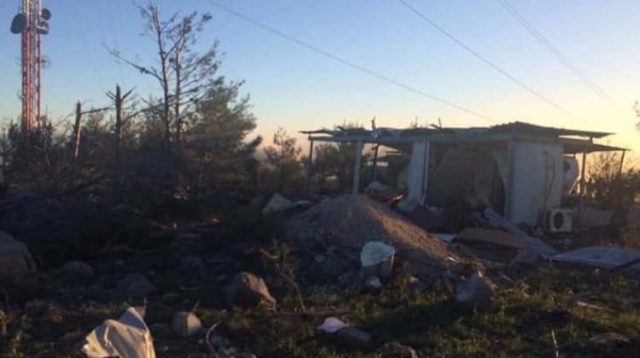
Making Sense of the Turkish Air Strikes on Sinjar and Karachok
Publication: Eurasia Daily Monitor Volume: 14 Issue: 64
By:

On April 25, the Turkish Air Force carried out strikes on the town of Sinjar (Iraqi Kurdistan) and on targets in the Karachok Mountains (northeastern Syria, between the towns of al-Hasakah and Qamishli) (Hürriyet, April 25). The airstrikes on Kurdish forces highlight Turkey’s determined stance regarding the Kurdistan Workers’ Party (PKK) and its affiliates in and outside Turkish borders. Nevertheless, the move also illustrates the deep fractures within the United States–led anti–Islamic State (IS) coalition itself.
The choice of allies and partners on the ground and, in particular, the reliance on the Syrian-Kurdish People’s Protection Units (YPG) has put the US-led anti-IS coalition in a direct clash with a North Atlantic Treaty Organization (NATO) ally—Turkey. Moreover, it has raised questions about the sustainability of the coalition and the bilateral ties between key coalition partners. Notably, the YPG’s presence and role in the coming offensives against the IS explicitly contradicts Turkey’s stance that any growing presence or further advancement of the PKK or its affiliates will not be tolerated. The Turkish government is specifically concerned that the weapons and military equipment provided to the YPG might be used in terrorist attacks inside Turkey because Ankara believes the “human resources” of the YPG, PKK, People’s Defense Forces (HPG) as well as the Iranian-based Kurdistan Free Life Party (PJAK) are quite interchangeable and mostly identical (Nato.int, 2016). Thus, the growing presence of these groups along the Turkish border and throughout northern Iraq and Syria is regarded as unacceptable.
Within this picture, Sinjar presents a major strategic hot spot. Turkish commentators have argued the town could become a second Qandil Mountain (NTV, January 5), referring to the famous mountain intensively used by the PKK as a training ground, headquarters, and a safe haven in northern Iraq. Of concern is not only the PKK’s growing presence in Sinjar, but also in and around Kirkuk—an area of high Turkish interest for both strategic reasons and due to kinship ties. For Ankara, the PKK’s Syrian offshoot YPG, which has advanced in northern Syria, poses a direct threat to Turkey’s national security.
Forty PKK and YPG- affiliated terrorists died in Turkey’s late-April bombing attacks on Sinjar, and 30 of them were killed in the attack on the Karachok Mountains (Sabah, April 25). In addition, five Peshmerga (armed forces of Iraqi Kurdistan) fighters lost their lives as unintended losses (Rudaw, April 25). Following the attacks, Russia and the US took steps to avoid further such Turkish actions by showing their presence in Tel Abyad and Afrin, respectively. Photos and video footage came out of a US commander visiting the Syrian town of Derik, close to the Turkish border, and walking shoulder-to-shoulder with the PKK’s Şahin Cilo (on Turkey’s terrorist watch list) (The Guardian, May 1). Additionally, a video of US military vehicles seen during a funeral ceremony organized for the people killed in the Turkish airstrikes brought irritation in Ankara (YouTube, April 30). Moreover, the YPG threatened that unless the US takes a clear stance and stops further Turkish airstrikes (EKurd, April 29), its fighters would withdraw from the Raqqa offensive. Salih Muslim, who heads the YPG-affiliated Democratic Union Party (PYD), called for a no-fly zone over Rojava (Iraq Now, April 30).
In terms of Turkey’s domestic dynamics, the timing of the aforementioned attacks seems cautiously calculated. Notably, they came just after the controversial referendum, in late April, in which the people voted to increase the president’s constitutional powers. At that point, the ruling party seemed more confident in its position (reminiscent of the start of Operation Euphrates Shield, launched after the July 15 coup attempt) and rightly believed that such a move would generate public support even beyond its own voter base. The absence of any serious criticism within Turkey so far, including from the opposition parties, shows the degree of support the move gathered. Both the Euphrates Shield Operation and the recent airstrikes illustrate that, contrary to assertions that the coup attempt–linked arrests have undermined Turkey’s counter-terrorism capabilities, in fact the government and the military are currently pursuing counter-terrorism goals much more effectively and in a more harmonized manner. As another domestic factor, both Euphrates Shield and the recent airstrikes closely followed intense and effective urban warfare campaigns against the PKK in Turkey—in Sur, Nusaybin and Cizre. Thus, in order to limit the PKK’s ability to move some of its fighters, military equipment and financial resources across the border to neighboring countries, Turkey has strategically extended its fight beyond its borders.
Considering the strategic significance of Sinjar—not only as a possible future “second Qandil” but also as a highly important passage point between Iraq and Syria, enabling the free movement of PKK-YPG-affiliated fighters—Turkey’s aerial bombardments sent several messages. First, they underlined Ankara’s uncompromising stance regarding the PKK and YPG’s presence in Iraq and Syria. Second, it showed that Turkey did not evaluate the Euphrates Shield Operation as a finished project, since its YPG- and PKK-related goals are not fully achieved yet (see Terrorism Monitor, April 7). Third, it sent a signal to its anti-IS coalition partners that despite their strong support for the YPG, Turkey may still target this group if Ankara sees its national interests at stake. Following Turkey’s move, the US and Russian deployments to the YPG-controlled northern Syrian cantons show that both the Washington-led coalition and Moscow acknowledge this possibility and the fact that only their physical presence might act as a deterrent.



